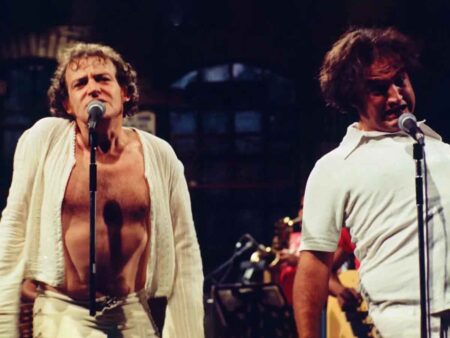In one of the final photos taken before his passing in 2016, Leon Russell is seen at the piano—his signature white hair and beard flowing, sunglasses off, deep in conversation and music with fellow artists Derek Trucks and Susan Tedeschi. It’s a quiet, intimate moment, but it speaks volumes.
Even near the end, Russell wasn’t just reminiscing about music—he was still in it, still shaping it. A lifetime of sound lived in those fingers. If you’ve heard American music in the last 60 years, chances are you’ve heard him, whether you realized it or not.
He was never a household name in the way that, say, Elton John or Eric Clapton were. But he played with them. Wrote for them. Led them. Leon was the secret sauce. The guy behind the curtain. A little country, a little gospel, a whole lotta groove. He was the wizard who made the greats sound greater.
Contents
The Session Man Who Shaped American Music
Long before the flowing robes and stage mystique, Leon Russell was a teenage piano prodigy from Tulsa who made his way to Los Angeles and joined the top tier of studio musicians. As part of the famed Wrecking Crew—the elite group behind many of the biggest records of the 1960s—Russell didn’t just accompany the hits. He helped shape them.
He played on recordings for the Beach Boys, Dick Dale, and Jan and Dean, blending gospel-influenced piano with a roadhouse sensibility. His style was loose but precise, able to lift a song without ever crowding it.
Russell became known as a musical chameleon—someone who could bring just the right touch, whether backing a crooner or rocking out on a surf tune. His versatility made him invaluable in an era when session players were the unsung architects of pop culture.
Songwriter Extraordinaire
Russell’s talents didn’t end at the piano. His songwriting catalog is staggering in both scope and influence.
“A Song for You” has been recorded by over 200 artists and remains a favorite for those looking to channel heartbreak with grace. “This Masquerade” became a crossover hit, notably for George Benson. And “Delta Lady,” written for Joe Cocker, gave voice to a swampy, soulful sound that came to define an era.
What made Russell’s songs stand out was their emotional depth and musical fluidity. He could shift between blues, country, jazz, and rock within the same song—and make it feel natural. His melodies were simple enough to sing and complex enough to last.
Bandleader and Solo Artist
By the early ’70s, Russell was ready to step out from behind the curtain. He helped assemble and lead the massive, high-energy ensemble that became Mad Dogs & Englishmen, Joe Cocker’s landmark tour and film project. Russell’s role as musical director gave him a taste of the frontman spotlight.
His solo debut followed quickly, drawing contributions from rock royalty like George Harrison, Ringo Starr, and Eric Clapton. The album was ambitious, sometimes eccentric, and packed with gems. Songs like “Tight Rope” and “Lady Blue” helped cement Russell’s identity as a solo artist: soulful, strange, and always compelling.
And visually, Leon was impossible to miss—his long hair, white beard, and top hat gave him the air of a mystical showman, somewhere between Southern preacher and rock ’n’ roll wizard.
Connecting Rock Royalty
Leon Russell had a unique gift for collaboration. He didn’t just play alongside legends—he often brought them together. He was part of the historic Concert for Bangladesh in 1971, joining George Harrison, Bob Dylan, and Eric Clapton onstage.
Over the years, Russell worked with an astonishing range of artists, from the Rolling Stones and Frank Sinatra to Willie Nelson and B.B. King. He didn’t adhere to genre boundaries—he erased them. His ability to float between scenes and elevate every project he touched made him a magnet for talent.
His late-career collaboration with Elton John on The Union introduced Russell to a new generation of fans and earned both artists widespread acclaim. It was a full-circle moment for Russell, reminding the world just how essential he had been all along.
Legacy and Recognition
Leon Russell received his long-overdue inductions into both the Rock and Roll Hall of Fame and the Songwriters Hall of Fame in the 2010s. He also earned six gold records and multiple Grammy nominations during his prolific career.
Though he never chased stardom in the traditional sense, his influence is woven through American music like thread through fabric. He was the connective tissue between genres, generations, and giants. Musicians knew it. Industry insiders knew it. And now, finally, more listeners are beginning to recognize the scope of what he accomplished.
A Farewell to the Master
That last image—Russell at his piano, surrounded by fellow artists—says everything. He wasn’t seeking applause or attention. He was doing what he always did: making music, mentoring quietly, leaving a mark without asking for credit.
Leon Russell didn’t need the spotlight to be luminous. He carried it with him.




